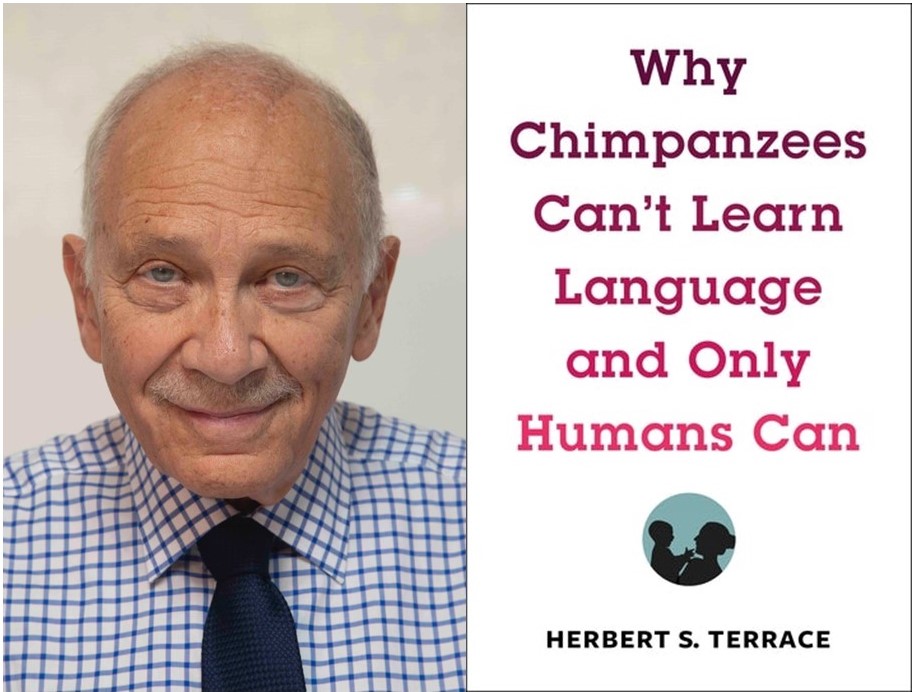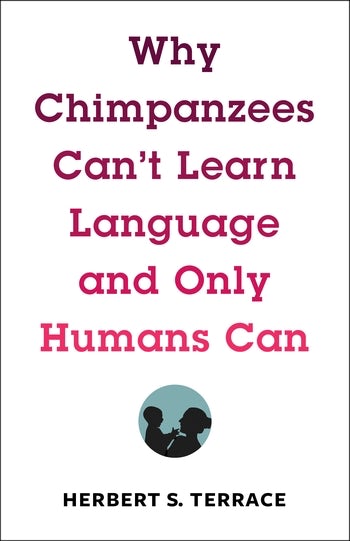Alfred Wallace’s Problem: Can the Theory of Evolution Explain Language?
By Herbert S. Terrace

“With characteristic clarity, [Terrace] gives a convincing account of language evolution in Darwinian terms, without appeal to miracles. This is an important new approach to an old and vexed problem.”
~Michael Corballis, author of The Truth About Language: What It Is and Where It Came From
Herbert S. Terrace, author of Why Chimpanzees Can’t Learn Language and Only Humans Can, discusses the question of evolution as an explanation for human language in this installation of his series on the origins of language.
Originally published in PsychologyToday.com.
• • • • • •
Language has been an embarrassment for the theory of evolution for more than 150 years. Charles Darwin, who thought that language evolved from animal communication, argued that, “The difference in mind between man and the higher animals, great as it is, is certainly one of degree and not of kind” (Darwin, 1871, p. 105).
That view was rejected by Max Müller, a well-known linguist, who claimed that, “The one great barrier between man and brute is Language. Man speaks, and no brute has ever uttered a word. Language is our Rubicon, and no brute will dare to cross it” (Müller, 1862, p. 354).
Ironically, Alfred Wallace, the co-founder of the theory of evolution, also rejected the idea that evolution can explain language. Wallace asked how man’s “superior intelligence” could result from natural selection, the basic principle of evolution, that would expand a creature’s powers only to the point at which it has an advantage over the competition in the struggle for existence.
Specifically, Wallace wondered why humans have “a large and well-developed brain quite disproportionate to his actual requirement” (Wallace, 1870). He could see no problem solved by language that could not be solved without it; that is why language would have been naturally selected.
“He could see no problem solved by language that could not be solved without it; that is why language would have been naturally selected.”
Upon hearing Wallace’s concern, Darwin replied, “I hope that you have not murdered too completely your own and my child” (Darwin, 1869). Yet Darwin was never able to specify just how language evolved.
Wallace’s concern, which has come to be known as “Wallace’s Problem,” assumed that language evolved as a unitary entity. It is now widely recognized, however, that language did not emerge full blown. Words had to evolve before grammar. If Wallace focused on words instead of language, the problem would have become, how were words selected from animal communication? That’s a much simpler question than how was grammar selected?
Noam Chomsky, the world’s foremost linguist, attempted to finesse Wallace’s problem by simplifying grammar to a single operation and claiming that grammar resulted from a recent mutation, a secondary principle of evolution (Berwick & Chomsky, 2014). Mutations result from random changes in an organism’s DNA.
Chomsky’s hypothesis suffers from two major flaws. The first is that grammar presupposes the existence of words. As Chomsky often reminds us, grammar makes it possible to create an infinite number of meanings by combining a finite number of words. Yet the mutation that Chomsky hypothesized made no provision for words.
Even if it did, a mutation that produced even a simple grammar would be orders of magnitude more complex than any known mutation, in short, a miracle.
“To address Wallace’s problem, it is necessary to show how the evolution of words was necessary for a species’ survival.”
To address Wallace’s problem, it is necessary to show how the evolution of words was necessary for a species’ survival. Derek Bickerton, an English-born American linguist, suggested they could have originated in Homo erectus’ quest for meat.
To satisfy the caloric needs of their larger brains, three times the size of a chimpanzee’s, Homo erectus required meat as its primary food source. A Homo erectus scout, who found an animal that had died naturally or was killed by a predator, had to recruit distant colleagues, who could not see the animal, to fend off rival scavengers and help in its butchery. To do that, the scout had to communicate the nature of the carcass and its location. That could only be done by “displaced reference,” a feature of language that refers to objects that can’t be seen by others.
For that kind of communication to have occurred, Homo erectus would have had to become more cooperative than chimpanzees. After an infant chimpanzee is born, its mother won’t allow anyone else to approach it for at least six months. Sarah Hrdy, an American anthropologist and primatologist, hypothesized that the necessary increment in cooperation resulted from collective breeding.
In that form of child rearing, infants not only begin to share affect with their mothers immediately after birth, but with other caretakers, such as a grandmother or sibling. The result is a more “emotionally modern” offspring, who will cooperate more with their alloparents than a chimpanzee would with its mother.
“Language is too complex to have resulted from a single evolutionary change.”
How cooperation and the need to communicate about targets of scavenging contributed to the origin of words will be the topic of my next blog. Meanwhile, we should recognize the mistake in Müller‘s and Wallace’s and reasoning about natural selection. Both should have heeded Darwin’s observation that evolution proceeds in “innumerable gradations”, one of which was the use of words before grammar.
Language is too complex to have resulted from a single evolutionary change. The failure to recognize that fact is why the evolution of language has been an embarrassment since Darwin speculated about its origin a century and a half ago.
References:
Bickerton, D. (2014). More Than Nature Needs: Language, Mind, and Evolution. Cambridge, MA, Harvard University Press.
Darwin, C. (1869). Letter to Alfred Russell Wallace, March 27, 1869. Darwin correspondence. https://www.darwinproject.ac.uk/entry-6684.
Darwin, C. (1871). The Descent of Man in Relation to Sex. London, Murray.
Hrdy, S. B. (2009). Mothers and Others: The Evolutionary Origins of Mutual Understanding. Cambridge, MA, Belknap Press of Harvard University Press.
Müller, M. (1862). The Science of Language. New York, Charles Scribner.
Wallace, A. R. (1870). Contributions to the Theory of Natural Selection: A Series of Essays. London, Macmillan and Company.
Catch up on Terrace’s series and save 30% on Why Chimpanzees Can’t Learn Language and Only Humans Can when you order from our website when you use coupon code: CUP30.


